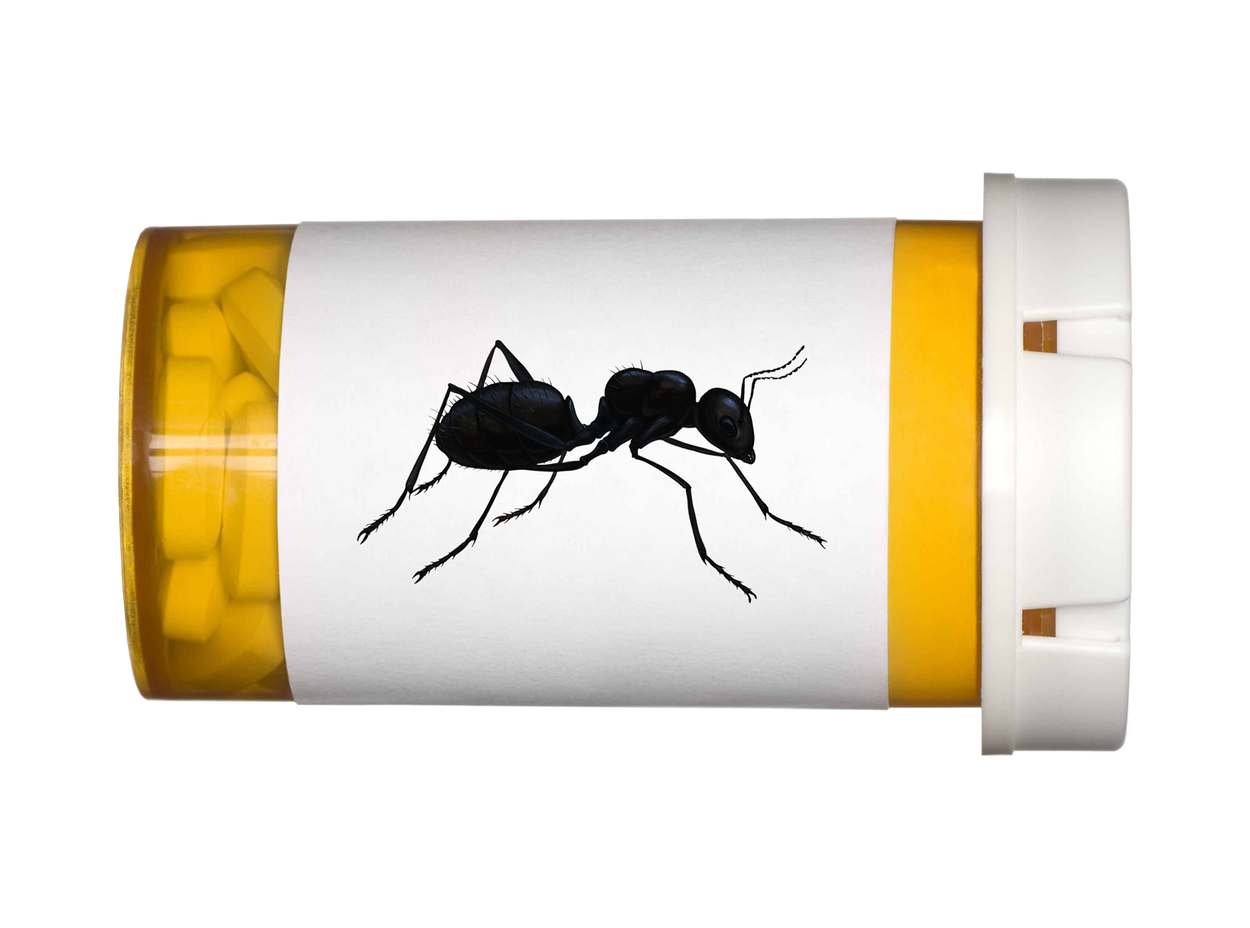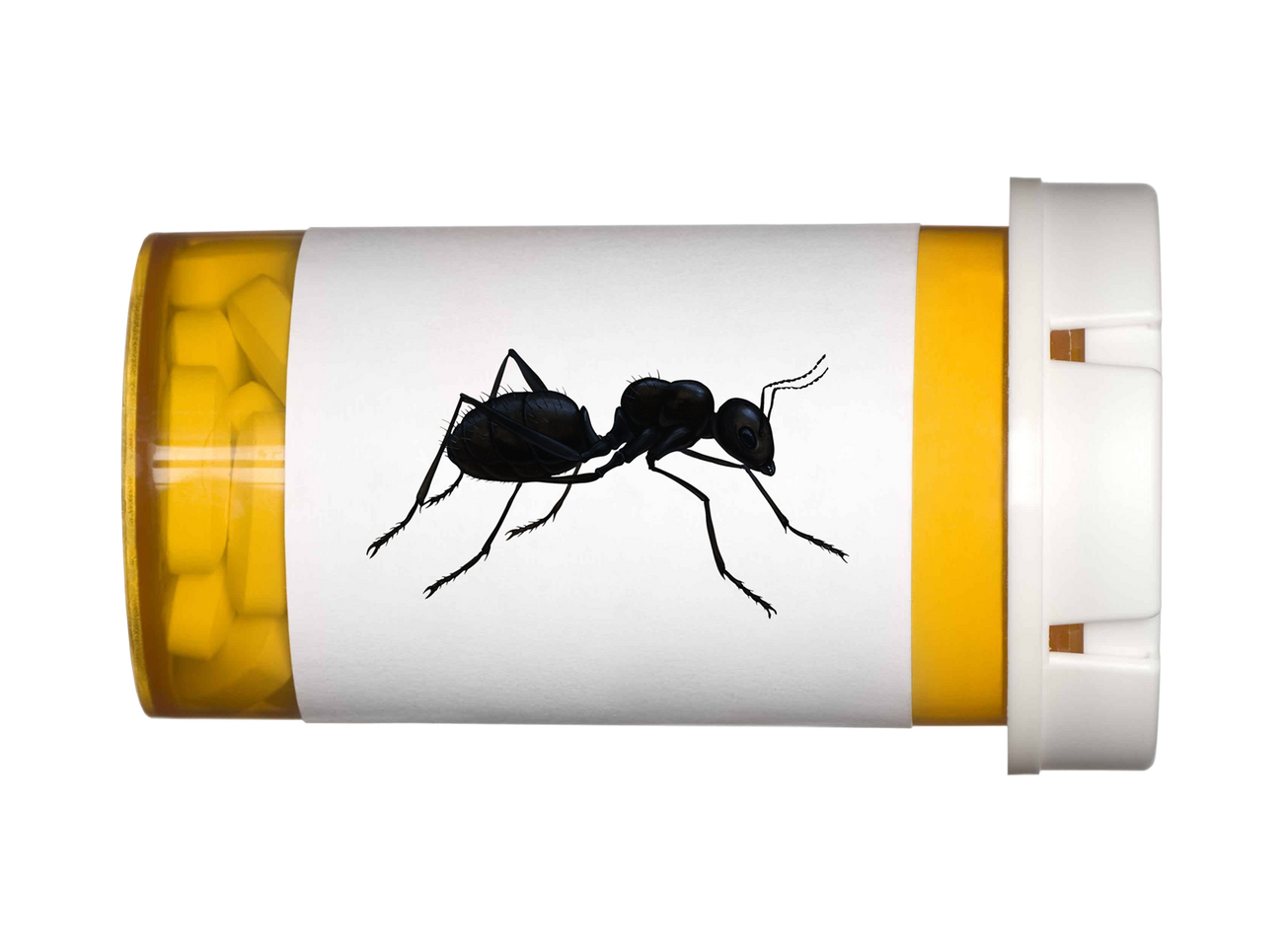Kosher Medicine
Will antibiotics derived from insects have legs for observant Jews?




Recent scientific research reveals that insects could help humans fight life-threatening illnesses. Scientists believe that antibiotics from insect microbiomes—clusters of individual microbes—could even replace traditional antibiotics. It’s big news for medical researchers, but it poses questions for observant Jews—questions that don’t have easy answers, or perhaps have too many answers.
Dr. Cameron Currie and a team of researchers at Currie Lab in the department of bacteriology at the University of Wisconsin-Madison have performed 50,000 trials since 2013 to test the effects of insect microbiomes. The project includes several institutions, including the UW-Madison School of Pharmacy and the UW School of Medicine and Public Health. “The thing I’m most excited about is that it’s a totally new source,” said Marc Chevrette, one of Currie Lab’s researchers. “No one has really done [insect studies] systematically until the last five years. It’s definitely one avenue that shows a lot of promise for the future.”
The need for new medicine is high. Bacteria that can cause infections have been building up a resistance to traditional antibiotics. It is thought that current medications will stop working for many people, putting them at risk for potentially life-threatening illnesses, like tuberculosis. Finding a new source of effective antibiotics is imperative.
“Due to resistance, antibiotics have an expiration date,” Chevrette said. “Because of that, we need to continue fueling the discovery pipeline for new things to stay ahead of the diseases.”
Creating antibiotics from insect-associated microbes goes something like this: Bugs are washed, then scientists either culture bacteria out of those washes or crush the insects to extract bacteria, then grow microbes that form the medication.
The sticking point for kosher-observant Jews is whether they can take antibiotics made from insects. The Torah forbids the consumption of most bugs—except certain grasshoppers—claiming they make people “unclean” (Leviticus 11:20-23). But when it comes to the kosher status of the potential new antibiotics, the lines are less clear.
Rabbi Sholey Klein, the kashrut administrator for Dallas Kosher in Texas, said this type of medicine would always be kosher because “microbiomes are inherently not bugs.”
“When you’re dealing with microbes, most things are kosher because they are not considered to be bugs,” Klein said. Since the Torah was given specifically to people, he noted, rabbis have interpreted that its laws only pertain to regular human experiences, which excludes what is invisible to the naked eye: “Things that you cannot see with the naked eye are not considered to be bugs, like the bacteria that grew in the blue cheese that I ate this morning. And if it’s small enough that it cannot be identified, like an aphid on a piece of lettuce, then it cannot be called a bug.”
But it may not be so simple: Individual cells from the bacteria are indeed microscopic, which would make them kosher under Torah law. However, the research team use billions or trillions of cells that clump together, forming bacterial cultures that are visible without a microscope. To the unaided eye, these look like suction cups the size of a fingerprint. Under a microscope, they appear as segmented spaghetti strands or snaking sausage links. These intricate structures may rule out the naked-eye argument.
Antibiotics are commonly ingested as liquids, tablets, or capsules, or they can be given by injection. Any way you slice it, taking these antibiotics would be consuming them into the body. If deemed nonkosher, this is forbidden. Yet another Jewish law could upend that argument. Pikuach nefesh—which roughly translates to “watching over a soul”—states that the risk of life-threatening infections overrides any kosher guidelines.
“An infection is serious stuff. To preserve a human life, you can do almost anything,” said Rabbi Avraham Juravel, the rabbinic coordinator for technical services for OU (Orthodox Union) Kosher, a kosher-certification organization based in Manhattan. “You can actually consume an ant or even bacon to preserve a human life. But it has to be proven that it will work. We’d have to know a lot more about the process of how they’re isolating and growing (microbiomes) to see if someone can take it or not.”
You can actually consume an ant or even bacon to preserve a human life. But it has to be proven that it will work.
So far, ants are the most promising insects. In 2018, the researchers discovered a new antibiotic, cyphomycin, from a species of Brazilian leaf-cutter ants; the antibiotic was effective in mice. The team still needs to run more tests to ensure that it is safe for human trials. If it passes, cyphomycin then heads to the FDA for approval.
The leaf-cutter has a unique, symbiotic relationship with the microbes that live on its body. They are separate organisms that function together. To help a nonscientist understand, Chevrette compares it to a farmer. Like a farmer growing corn, the ant’s body produces a fungus that it uses for food. To deal with the infection of its “crops,” a bacteria coating the ant’s body—which appears like sprinkles of powdered sugar to the naked eye—produces an antibiotic.
But farmers—to continue with Chevrette’s metaphor—don’t needlessly spray their crops. Studies have shown that traditional antibiotics are often overprescribed, one of the contributing factors to the buildup of immunity. In 2016, the Centers for Disease Control and Prevention released a report that at least 30% of antibiotics (around 47 million prescriptions) annually prescribed in the U.S. were unnecessary. Most often, they are recommended to treat viral infections, including the common cold, bronchitis, and sinus and ear infections. Antibiotics treat bacterial infections and have no impact on viruses.
This is a gray area for kosher-observant Jews because the antibiotics are then considered unnecessary, sidestepping the pikuach nefesh law. While Juravel said that he would still take the medication if his doctor prescribed it, he suggests that hesitant Jews consult a rabbi who is an expert with kosher law and scientific knowledge.
“If it’s a whole organism that is visible to the eye, then this is probably forbidden to take unless it was life-threatening,” said Rabbi Shmuel Brody, who is Hasidic and a life coach in Baltimore. “Even if it were OK, I would not take it for something like the stomach flu. I would certainly consult with a rabbi who was an expert in this area for Halachic [Torah law] guidance.”
Then again, sometimes illnesses that start off as non-life-threatening can become life-threatening if they’re not treated soon enough. “Anyone could argue that someone taking antibiotics could be in danger because, if you don’t treat the infection, it could migrate to your lungs and become pneumonia,” Klein said. “You stop things early and stop them from becoming something else to save someone’s life.”
This is complicated stuff, even for rabbis who oversee kashrut certification. There have been many disputes over whether something is kosher versus nonkosher. One of the best known is from 2004, when copepods—a distant cousin of shrimp—were discovered in New York’s unfiltered tap water. Most of the tiny creatures were microscopic, but some were large enough to be seen, causing conflict within the OU about the need to filter tap water. A professor of biology and Talmudic law, Rabbi Moshe Dovid Tendler, first spotted the copepods through a dissecting microscope. Simply being aware of their existence in the tap water was enough for him to recommend filtering them out. All of this debate resulted in panicked Jews carrying around bottled water.
So, whether insect-derived medications are kosher depends on which rule is being followed. Leviticus 11:20-23 forbids the consumption of most bugs (so they’re nonkosher). But people can’t see the individual microbes with the naked eye (kosher). However, microbiomes from insect antibiotic cultures are visible (nonkosher). All that may be irrelevant, though, because pikuach nefesh honors life above all else (kosher). On the other hand, this kind of medicine is often overprescribed for non-life-threatening illnesses (nonkosher).
While these uncertainties provide endless Shabbat dinner debates, they also fuel fears of unwittingly breaking kosher laws. So what can a kosher-observant Jew do?
If a majority of Halachic rabbis agreed that insect antibiotics were kosher in every circumstance, Brody said he would feel confident in taking them: “We utilize anything in God’s universe for the benefit of man. Once the Halachic industry has given their opinion, I would totally be OK with it.”
Rooksie David, a Torah-observant homeopath in Seattle, feels similarly: “I’d be very comfortable taking an insect-based antibiotic if it was certified by a reliable kosher-certifying agency and had undergone rigorous scientific drug trials to prove its efficacy.”
Flummoxed Jews can breathe a little easier. Scientists are also looking into several different systems, including invertebrates—like sea squirts and sponges—and human and animal microbiomes. The soil near plant roots, called the rhizosphere, appears particularly promising as well. If these alternatives pan out, kosher-observant Jews could be selective for both their health and religion.
No one will have to make this choice anytime soon. Chevrette says getting medication on the market is a lengthy process, and it will take around another 10 years to run more tests and studies, then seek FDA approval. For the time being, the question of whether insect antibiotics are kosher won’t bug anyone.
Rachel R. Román is a writer and photographer who has written for Forward magazine and Geekwire.com. She has written and taken pictures for the Jewish Telegraphic Agency, The Cholent and Jewish in Seattle magazine.